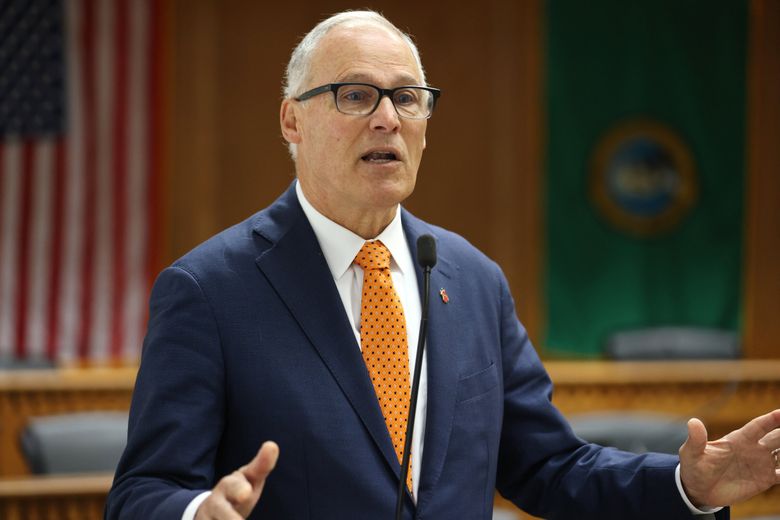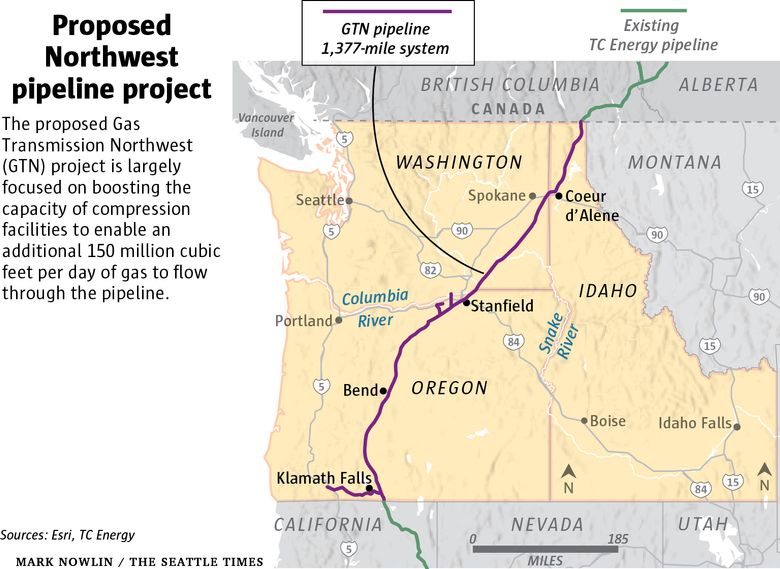
West Coast attorneys general and environmental groups have asked that a federal commission reconsider its decision to approve a controversial gas pipeline project in the Pacific Northwest, Gov. Jay Inslee announced at an online media briefing Wednesday.
Gas Transmission Northwest, a subsidiary of TC Energy, brings in natural gas, which is mostly methane, from Alberta via a 1,377-mile pipeline that cuts through Idaho, Eastern Washington and Oregon to link with California pipeline networks.
The Federal Energy Regulatory Commission voted last month to authorize a project that is anticipated to allow TC Energy to increase the volume of the fracked gas by about 150 million cubic feet per day through the existing pipeline. The gas would serve Intermountain Gas, Cascade Natural Gas and Tourmaline Oil Marketing, according to filings with the commission.
The project has been estimated to increase greenhouse gas emissions by the equivalent of 3.47 million metric tons of carbon dioxide annually for the next three decades, according to a filing from Washington state Attorney General Bob Ferguson and the Oregon and California justice departments.
This week, attorneys general of Washington, Oregon and California and Columbia Riverkeeper and Rogue Climate filed petitions for the regulatory commission to reconsider and withdraw its decision approving the project. The environmental groups allege that the commission violated the Natural Gas Act, National Environmental Policy Act and the Administrative Procedure Act in approving the project.

They argue the project ignores the legal requirements and aspirations of the West Coast states to move away from climate-warming fossil fuels. Washington state lawmakers have passed a spate of climate legislation in recent years that placed utilities and the state’s largest emitting businesses on a fast track to become carbon-free.
“It’s hard to imagine an argument why it’s in the public interest to violate laws in the state of Washington,” Inslee said at the online media briefing. “It’s dangerous, it’s bad for our kids’ health, it’s bad for our economy, and we are asking for a rehearing to ask FERC to do its job.”
Washington’s Climate Commitment Act set a cap on statewide emissions that gradually ratchets down over time and requires most of the state’s largest emitters of greenhouse gases to buy allowances at quarterly auctions to cover their pollution above the cap. Using 1990 emissions as the baseline, the state is required to reduce its emissions 95% by 2050.
And the Clean Energy Transformation Act requires the state’s electric utilities to become carbon-free by 2045.
If Gas Transmission Northwest’s pipeline operates as proposed, in 2050 it would represent 48% of the region’s target greenhouse gas emissions from all sources, according to the governor.
“Our argument and the state’s argument is that FERC must take into account these very real state laws and policies that require us to move away from gas in its analysis of need,” Audrey Leonard, staff attorney for Columbia Riverkeeper, said in a phone call Wednesday.
In 2019, TC Energy announced the project to boost the pipeline’s capacity and reliability largely by improving three compressor stations in Kootenai County, Idaho; Walla Walla County; and Sherman County, Ore. The compressors are like the engines powering the long-distance gas pipelines, compressing the gas to allow it to flow through the pipeline.
The project saw opposition along the way from more than half a dozen members of Congress representing Washington and Oregon; the Columbia River Inter-Tribal Fish Commission; the attorneys general of Oregon, Washington and California; Inslee and Oregon Gov. Tina Kotek; and nine Oregon and Washington state lawmakers.
Demand for natural gas transportation service on the existing Gas Transmission Northwest system has grown by more than 26% since 2014, according to TC Energy.
“We urge FERC to act promptly on all rehearing requests so this project can proceed and consumers in the region can benefit from more affordable and reliable energy,” a TC Energy spokesperson said in an emailed statement.
Natural gas remains a big part of the Northwest energy mix.
When it leaks unburnt into the atmosphere, the methane in natural gas is a much more potent, although shorter-lived, greenhouse gas than carbon dioxide.
When natural gas combusts, it emits less carbon dioxide than coal and crude oil, producing an equivalent of the amount of energy, and the natural gas industry has argued that should play a key role in helping transition to cleaner fuels.
The regulatory commission has 30 days to respond to the rehearing request.
If the commission ignores or denies the request, the state justice departments or environmental groups can challenge its decision in federal court, Leonard said.
"general" - Google News
November 23, 2023 at 07:20AM
https://ift.tt/rj71AqL
West Coast attorneys general ask federal commission to rethink approval of gas pipeline project - The Seattle Times
"general" - Google News
https://ift.tt/90ZaSJP
https://ift.tt/ZfNCzIo
Bagikan Berita Ini














The opinions expressed in reader comments are those of the author only and do not reflect the opinions of The Seattle Times.